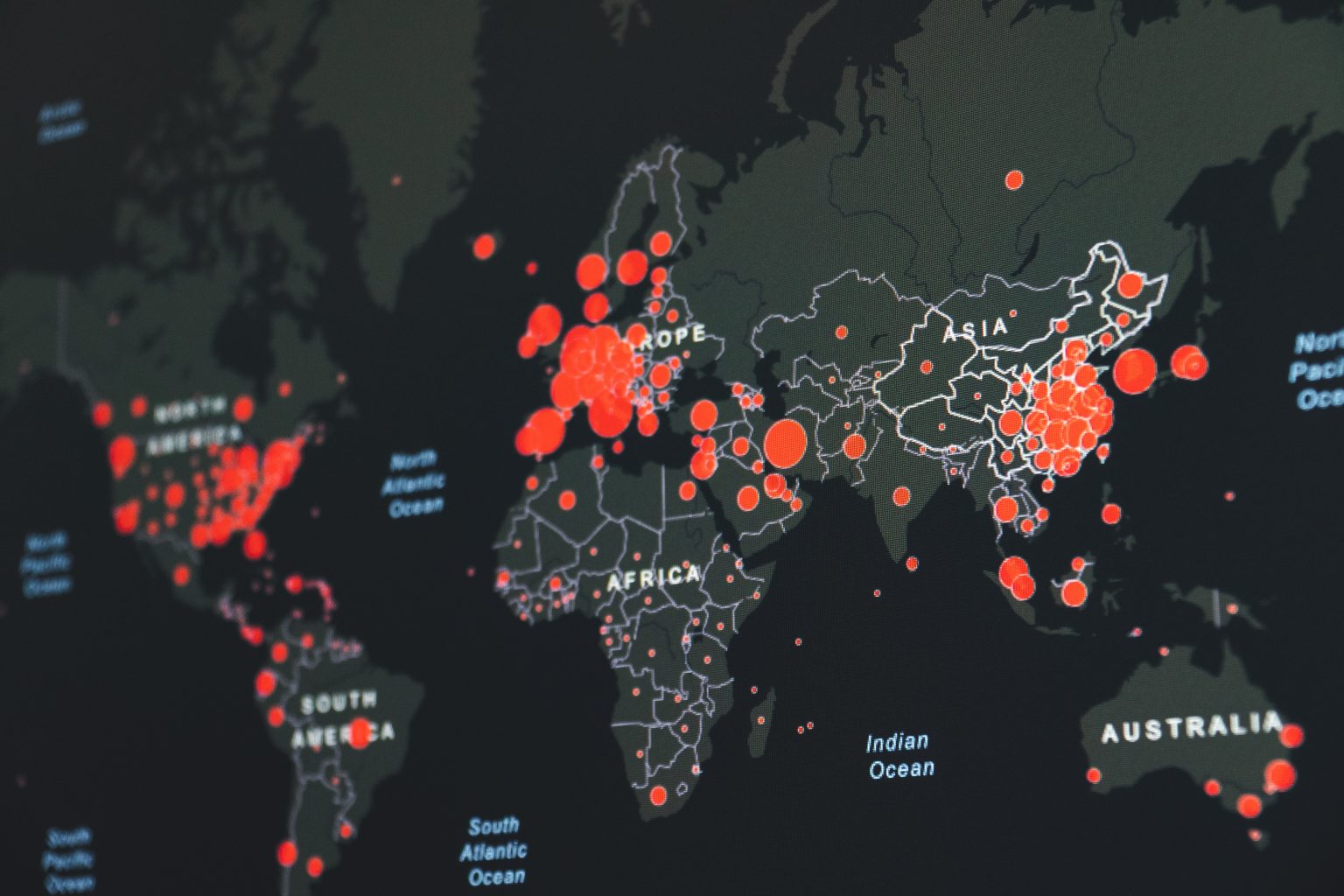
In the centre of the battle over reliable information and the Covid-19 ‘infodemic’, the World Health Organization released an update to its mythbusters advice to the public. Take a look.
Let’s flatten the infodemic curve
We are all being exposed to a huge amount of COVID-19 information on a daily basis, and not all of it is reliable. Here are some tips for telling the difference and stopping the spread of misinformation.
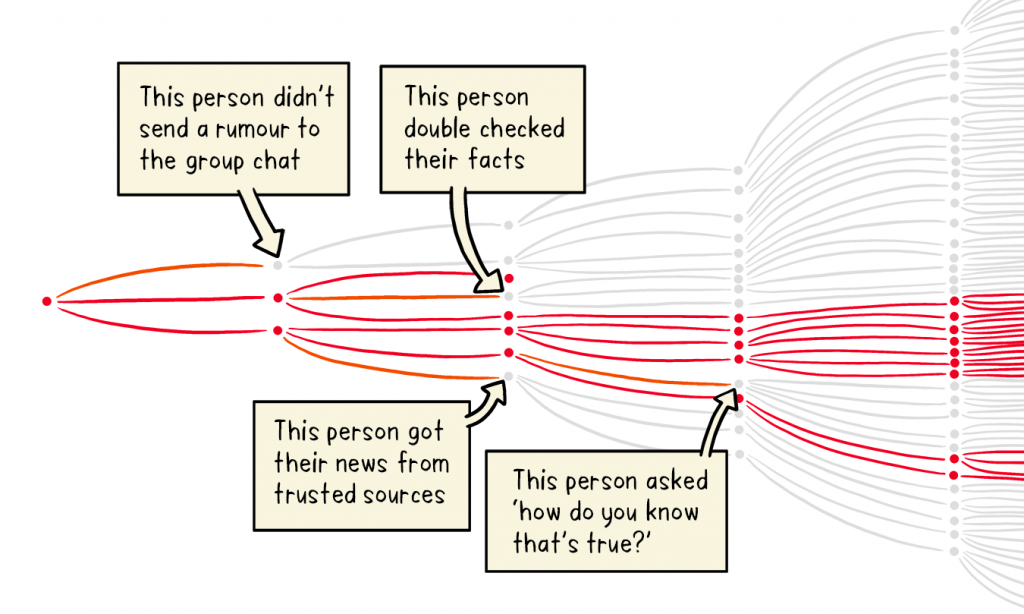
FACT: Vitamin and mineral supplements cannot cure COVID-19
Micronutrients, such as vitamins D and C and zinc, are critical for a well-functioning immune system and play a vital role in promoting health and nutritional well-being. There is currently no guidance on the use of micronutrient supplements as a treatment of COVID-19.
WHO is coordinating efforts to develop and evaluate medicines to treat COVID-19
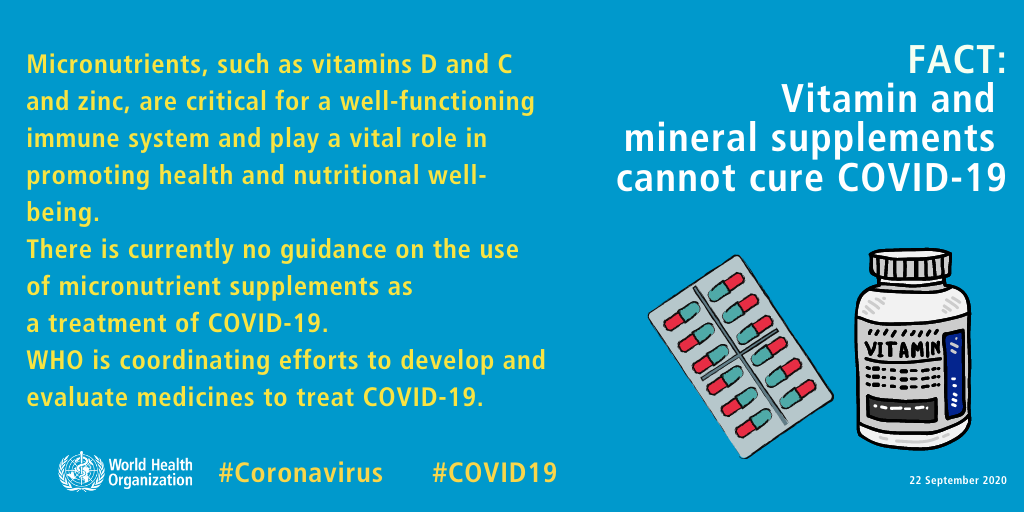
FACT: Studies show hydroxychloroquine does not have clinical benefits in treating COVID-19
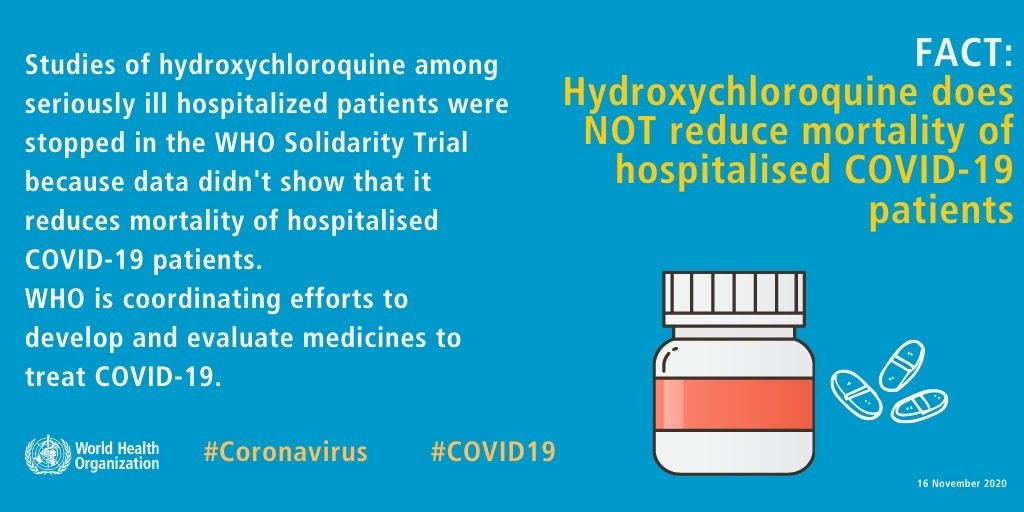
Hydroxychloroquine or chloroquine, a treatment for malaria, lupus erythematosus, and rheumatoid arthritis, has been under study as a possible treatment for COVID-19. Current data shows that this drug does not reduce deaths among hospitalised COVID-19 patients, nor help people with moderate disease.* The use of hydoxychloroquine and chloroquine is accepted as generally safe for patients with malaria and autoimmune diseases, but its use where not indicated and without medical supervision can cause serious side effects and should be avoided.
* More decisive research is needed to assess its value in patients with mild disease or as pre- or post-exposure prophylaxis in patients exposed to COVID-19.
Is dexamethasone a treatment for all COVID-19 patients?
Dexamethasone should be reserved for patients who need it most. It should not be stockpiled.
It provided no improvement for patients with mild symptoms. Dexamethasone is a corticosteroid used for its anti-inflammatory and immunosuppressive effects. For some COVID-19 patients on ventilators, a daily 6 mg dose of dexamethasone for 10 days improved their health
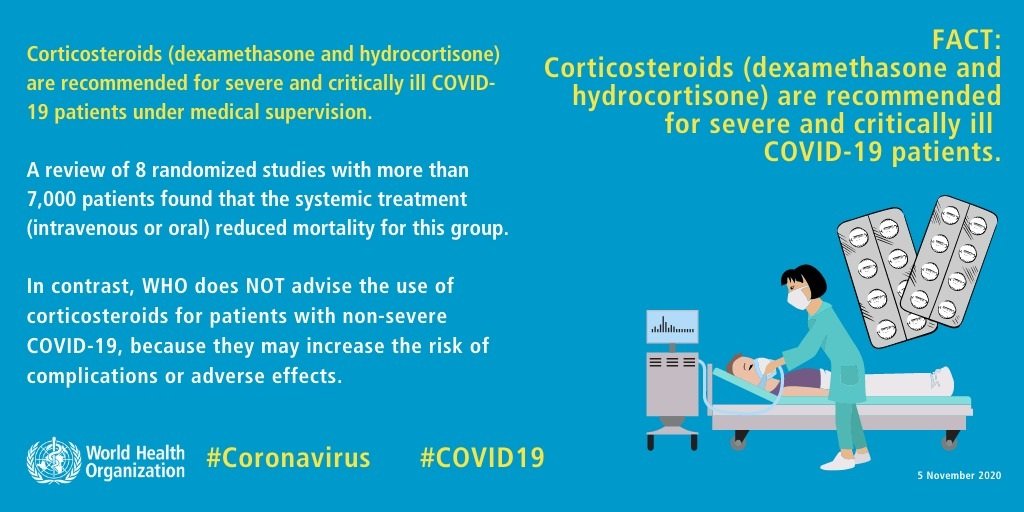
FACT: People should NOT wear masks while exercising
People should NOT wear masks when exercising, as masks may reduce the ability to breathe comfortably.
Sweat can make the mask become wet more quickly which makes it difficult to breathe and promotes the growth of microorganisms. The important preventive measure during exercise is to maintain physical distance of at least one meter from others.
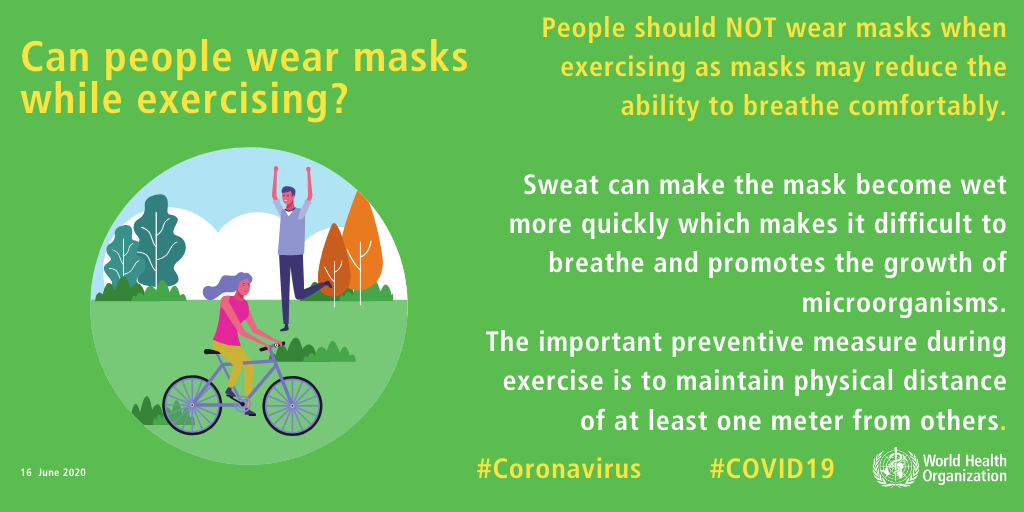
Fact: Water or swimming does not transmit the COVID-19 virus
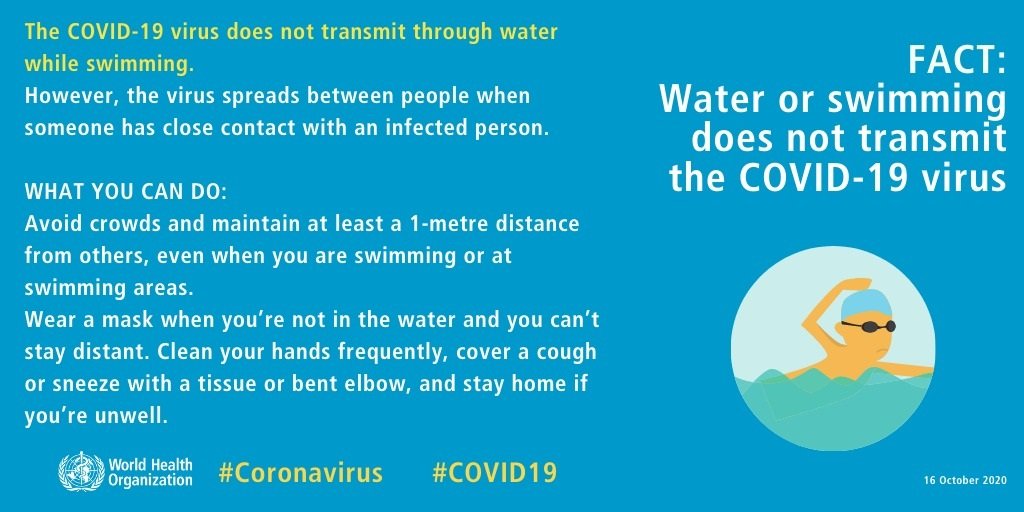
The COVID-19 virus does not transmit through water while swimming. However, the virus spreads between people when someone has close contact with an infected person.
WHAT YOU CAN DO:
Avoid crowds and maintain at least a 1-metre distance from others, even when you are swimming or at swimming areas. Wear a mask when you’re not in the water and you can’t stay distant. Clean your hands frequently, cover a cough or sneeze with a tissue or bent elbow, and stay home if you’re unwell.
FACT: The likelihood of shoes spreading COVID-19 is very low
The likelihood of COVID-19 being spread on shoes and infecting individuals is very low. As a precautionary measure, particularly in homes where infants and small children crawl or play on floors, consider leaving your shoes at the entrance of your home. This will help prevent contact with dirt or any waste that could be carried on the soles of shoes.
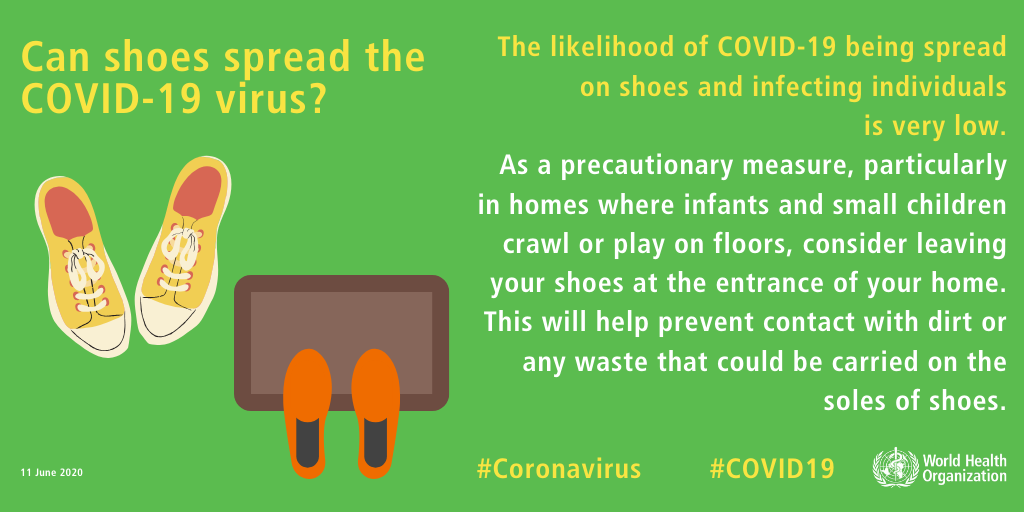
FACT: The coronavirus disease (COVID-19) is caused by a virus, NOT by bacteria
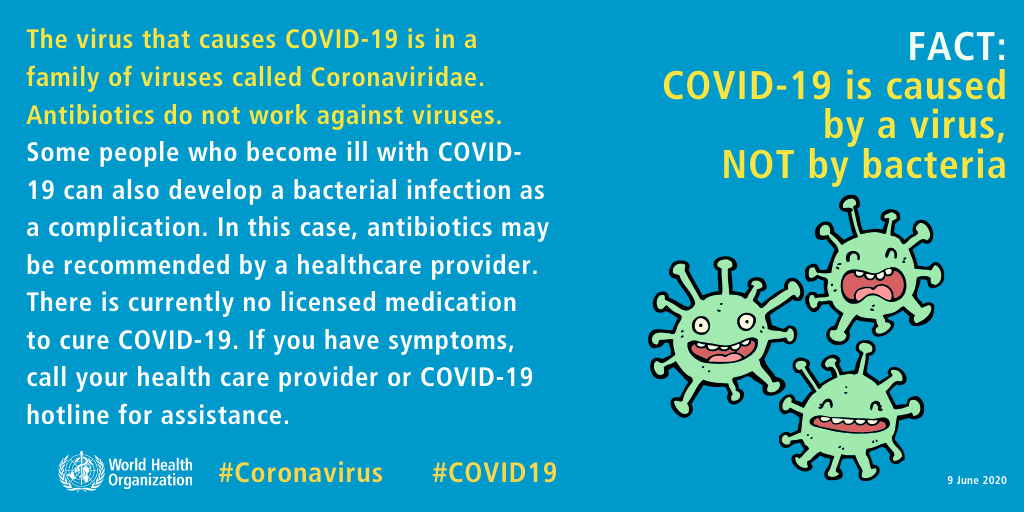
The virus that causes COVID-19 is in a family of viruses called Coronaviridae. Antibiotics do not work against viruses.
Some people who become ill with COVID-19 can also develop a bacterial infection as a complication. In this case, antibiotics may be recommended by a health care provider.
There is currently no licensed medication to cure COVID-19. If you have symptoms, call your health care provider or COVID-19 hotline for assistance
- For many more myths busted in the series by the World Health Organisation, take a look.
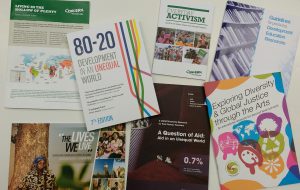
Your voice matters – 2026 user survey open
It’s January, its 2026, and we want to hear what you’d like us to feature or work on in 2026.
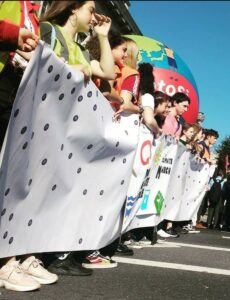
Calling Post Primary Teachers – Survey Participation Request
Your voice is vital in shaping the future of education for sustainable development in Ireland. Join a national survey for post primary teachers in October, led by DCU researcher Valerie Lewis
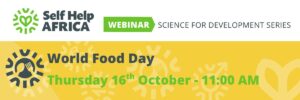
Webinar: Science for development on World Food Day
The webinar will feature YSTE projects, from Santa Sabina Dominican College (Dublin), Moate Community School (Westmeath) and CBS Thurles that focussed on nutrition and better food production, with Self Help Africa’s nutrition and gender specialist in Ethiopia, Sara Demissew.
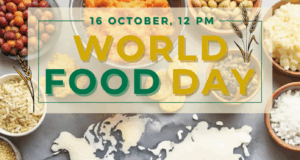
Student & teacher webinar: Food, hunger and SDG 2
Join the World Food Day webinar for post primary school students and teachers which will explore SDG 2, hunger in today’s world and how you can make a difference locally and globally.

Beth Doherty: Youth Activism and the Climate Crisis
From School Strikes to Global Climate Talks The latest episode of the Irish Global Solidarity in 100 Objects podcast features Beth Doherty, climate activist and

Mary Lawlor: Defending Human Rights Defenders
A Conversation with the UN Special Rapporteur for Human Rights Defenders The latest episode of the Irish Global Solidarity in 100 Objects podcast features Mary
